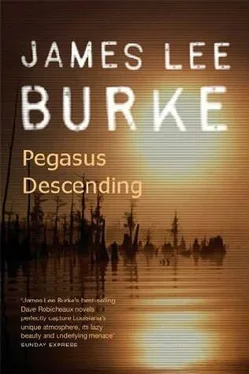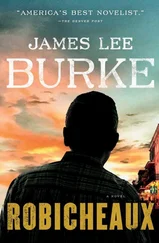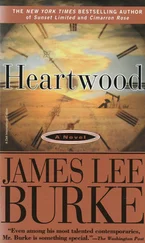THAT EVENING he sat next to me in a canvas chair on the bayou, at the back of my property, flipping a cork and baited hook from a cane pole out on the edge of the current. The evening sky was green, the wind cool in the trees, and the lights had just come on in the park across the water. A dragonfly lit on the Clete’s cork and floated with it past the flowers blooming among the hyacinths.
“I felt like two cents. Did I read this guy all wrong?” he said.
“Who cares? You’re a good guy, Cletus. You’ve always been on the right side of things. You don’t have to prove anything,” I said.
He had eaten and showered after returning from New Orleans, but his face still had an empty look, like that of a man who has just awakened from sleep and isn’t sure where he is. Clete had been on the full-tilt boogie for more than three decades now, and I wondered if the bill was starting to come due.
“The crazy thing is, I don’t even know why I went after this guy,” he said.
“Because you don’t like frauds and guys who use religion to sell wars.”
He rubbed one eye with his fist. “The guy seemed on the square.”
“He’s not, Clete. He’s a con man, and the guy he’s probably conned the most is himself. But let’s get off the dime here. Alridge knows Bello Lujan’s wife?”
“Yeah, he was upset about the kid getting blown away. I think it really put a nail in his head.”
“Like maybe he feels guilt about it?”
“Something like that. Or maybe he knows why Lujan was killed.”
“So I’m glad you went after him.”
“Really?” he said, looking me at me directly for the first time since his return from New Orleans.
“Really,” I said.
ONE TIME WHILE SWACKED on Cambodian red and a quart of stolen Scotch, a sergeant in my platoon who had served in World War II, Korea, and Vietnam told me he was the wisest man he had ever known.
“Why’s that?” I asked.
“Because I’ve spent a lifetime seeing people in duress,” he replied.
“So?” I said.
“That’s when the best and worst in people comes out. When they’re in duress. Most of the time the best comes out. Sometimes it don’t.”
“What happens when the worst comes out?” I asked.
“You got to remember who you are so you don’t become like the people around you. Each night you tell yourself over and over you got a special place inside you where you live. It’s like a private cathedral nobody can touch. That’s the secret to sanity, Loot. But you can’t tell anybody about your special place.”
“Why not?” I asked.
“Because once they know you got that private place in your head, they’ll strap you down and kill your brain cells with electroshock.”
I was about to have the opportunity to test the wisdom of the sergeant’s words.
MONARCH LITTLE’S BAIL was reduced Monday morning on the firearms violation to twenty-five thousand dollars. Through a friendly bondsman who allowed his clients to pay off his ten percent fee on the installment plan, Monarch was back on the street in time for lunch at the same McDonald’s where he’d gotten into it with Slim Bruxal and Tony Lujan.
But the problem with Monarch’s release from jail didn’t lie with Monarch, at least not directly. Helen called me into her office at 1 p.m.
“How much tolerance do you have for Bello Lujan?” she asked.
“Considering the fact he broke out a window in a cruiser with his head in order to spit on me, not very much,” I replied.
“You’re probably the only person in the department he’ll listen to,” she said.
I knew where she was headed. “No, Bello is not my responsibility. If you want a nursemaid for this guy, find somebody else,” I said.
“He respects you.”
“ Bello is an animal. He doesn’t respect anybody or anything.”
Helen drummed her fingers softly on her desk pad, her eyes lowered. “We’ve come a long way since the civil rights era, Dave. I don’t want to see that progress undone.”
“Then figure out a way to put Bello in a cage. Just leave me out of it. I don’t like getting spit on. I don’t like getting used, either.”
She snuffed now in her nose. “I can’t blame you for your feelings. Don’t worry about it. I’ll work out something else,” she said. She swiveled around in her chair and gazed out the window.
“That’s it?” I said.
“That’s it,” she said.
When your slider isn’t working and your fastball couldn’t find the strike zone if it had eyes on it, what’s the only pitch to throw? The answer is always the same: the humble change-up. You hold the ball deep in your palm, then let the batter’s overwrought watch spring destroy his timing. Helen had just floated a beaut down the pipe. I went back to my office and tried to bury myself in paperwork, but I couldn’t get Bellerophon Lujan and the primitive, violent mind-set he represented out of my thoughts.
He was a creature out of the past, but one that every southerner of my generation recognizes and instinctively avoids if possible. It’s facile to call his kind racist. In fact, race is almost a cosmetic issue when it comes to understanding the Bello Lujans of the world. They’re often fond of black people individually but they resent if not despise them as a group. Their anger lives like a benign form of clap in their blood. Instead of destroying them, it energizes them, defines who they are, and allows them to use social outrage to intimidate other whites.
Their ignorance is a given. In fact, they take pride in it and use it as a weapon. The threat of violence is implicit in all their rhetoric and in the bold stare of their eyes. Their greatest fear as well as their greatest enemy is knowledge of themselves. Like Plato’s prisoners in “The Allegory of the Cave,” they will perpetrate any hateful act, including murder, on the individual who tries to set them free from their chains.
South Louisiana ’s cultural mores have always been French Catholic in origin, and hence the Klan has never had a strong foothold here, at least not since Reconstruction and the short-lived influence of the White League. But that doesn’t mean that violence and cruelty and the sexual exploitation of Negroes did not occur here. When I was in high school, white kids went nigger-knocking along rural roads, shooting people of color with BB guns or throwing M-80s on their galleries or hurling “torpedoes,” tightly compacted balls that exploded upon impact, against the paint jobs of their cars and pickup trucks. I remembered seeing Bello leaning out of a speeding junker, his face split with a grin, just before he splattered a black man dressed for church with a half-eaten mayonnaise and tomato sandwich.
But there was a much darker story that had circulated about Bello, one that gradually died but one that was never quite laid to rest, either. Years ago, in a parish to the north of us, a middle-aged white woman who operated a grocery store on a dirt road had just closed the store for the night when a man of mixed blood, one she later described as a “red-bone,” tapped on the glass and said he needed milk for his baby. The store owner peered through the glass and thought she saw the humped silhouette of a woman in the front seat of his automobile. She was certain she heard the muffled cries of an infant.
She unlocked the door and let the man in. He walked past her to the cooler in back, an odor like fermented fruit and stale sweat sliding off her face. She turned her back and continued counting the day’s receipts. She heard him slip a heavy glass container of milk from the cooler and place it on the counter. She turned around to take his money, just as his fist exploded on her nose and mouth. Then he came through the swinging gate on the corner, pinned her to the floor, and beat her bloody with both fists. After he sodomized her, he raked the cash off the counter into a paper bag with his forearm, picked up the bottle of milk, and started to leave. But a two-dollar bill thumbtacked on the wall caught his eye. He pulled the bill loose from the tacks and left the store, the bell over the door tinkling behind him.
Читать дальше












